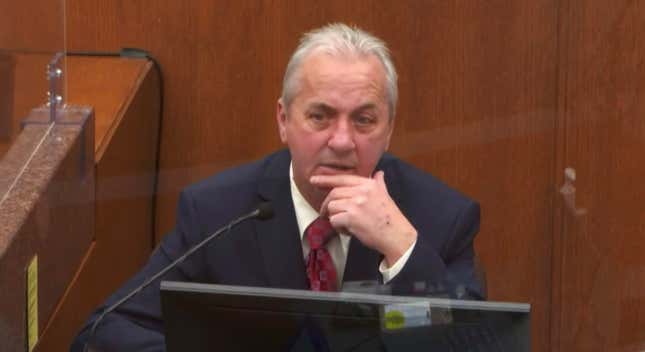
The first week of witness testimony in the Derek Chauvin trial ended with a veteran lieutenant of the Minneapolis Police Department stating the obvious: that putting a knee on someone’s neck “could kill them” and Chauvin’s restraint of George Floyd in that manner was “totally unnecessary.”
Though obvious, the testimony of the most senior member of the police force that employed Chauvin at the time when he knelt on Floyd’s neck for nearly 10 minutes until Floyd died could be instrumental in swaying the jurors.
Speaking from the witness stand on Thursday, Lt. Richard Zimmerman testified that Chauvin’s deadly use of force was uncalled for and did not appear to follow training guidelines, reports USA Today.
More of Zimmerman’s testimony from the Star Tribune:
Prosecutor Matthew Frank asked Zimmerman whether he was ever trained to put a knee on the neck of someone in handcuffs.
“No, I haven’t,” he said.
Zimmerman said such a tactic would fall under the most extreme level of force by an officer, that being “deadly force.”
“If your knee is on someone’s neck, that could kill them,” he said.
Frank then asked how much a threat a suspect would be once handcuffed.
“The threat level goes down all the way,” the lieutenant said. “They are cuffed; how can they hurt you? ... You getting injured is way down,” apart from possibly getting kicked, he continued.
Zimmerman’s testimony echoed that of Chauvin’s former supervisor, David Pleoger, on Thursday that the officers who responded to Floyd could have ended their restraint when he was no longer resistant. Body camera footage played in court this week showed that Chauvin’s knee was still on Floyd’s neck even when EMTs confirmed he had no pulse and that a paramedic had to ask him to remove his knee so Floyd could be transferred to an ambulance.
Zimmerman has served longer than any other officer in the Minneapolis Police Department, and his uncompromising testimony about the nature of Chauvin’s use of force is notable for how it doesn’t even try to excuse the actions of his “brother in blue”—though officers have been known to do so more often than not.
Eric Nelson, Chauvin’s defense attorney, did try to paint Zimmerman’s own training as outdated and not in line with the reality on the streets, and upon cross-examination, Zimmerman agreed with Nelson’s question that a handcuffed person can still pose a threat to officers.
Can an unmoving person, though?
Zimmerman, however, quashed the argument that the defense has attempted to put forward that the angry bystanders who spoke out against Chauvin’s treatment of Floyd bore some responsibility for the cop’s behavior.
“It doesn’t matter, the crowd, as long as they’re not attacking you,” he said. “The crowd shouldn’t have an effect on your actions.”
John Edwards, another Minneapolis police officer, testified on Friday that he arrived on the scene of the incident after Floyd had been taken to hospital and asked J. Alexander Keung and Thomas Lane what happened to the victim. Edwards said he did not learn that the arrest involved a critical incident or that Floyd had died, until later.
Friday’s hearing was adjourned early, with the trial set to reconvene on Monday at 10:15 a.m. ET.
Chauvin is facing potential conviction on charges of second-degree murder, third-degree murder and second-degree manslaughter.

